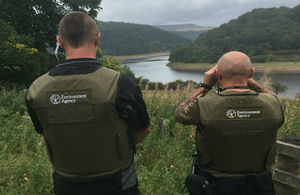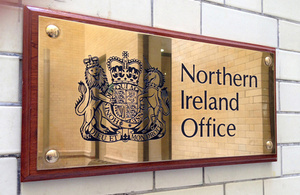Close season for coarse fishing gets underway for 2021
Press release
The Environment Agency is reminding anglers the ‘close season’ for coarse fish in rivers comes into effect from Monday 15 March and runs until 15 June.

The Environment Agency is reminding anglers the ‘close season’ for coarse fish in rivers comes into effect from Monday 15 March and runs until 15 June.
The annual close season helps to protect fish stocks across England when they are spawning by preventing fishing for coarse fish in rivers, streams, drains and specified canals, as well as ‘sites of special scientific interest’ (SSSI) stillwaters.
Throughout the close season, Environment Agency (EA) officers conduct patrols to enforce the close season. As part of Operation CLAMPDOWN, now in its ninth year, Angling Trust (AT) volunteers support the EA by keeping watch on riverbanks and reporting incidents to the 24-hour incident hotline.
EA fisheries enforcement officers and AT volunteer bailiffs patrol riverbanks to ensure anglers observe the close season rules. They also regularly patrol lakes, canals and ponds to make sure all anglers have a valid rod fishing licence. Anyone fishing without a fishing licence can face a court hearing and run the risk of prosecution.
Kevin Austin, Deputy Director for Agriculture, Fisheries and the Natural Environment at the Environment Agency, said:
The close season aims to protect fish while they are spawning which improves the health and resilience of our fish stocks. Alongside our fisheries improvement work, the close season gives our fish populations the chance to recover.
We always encourage everyone to give fishing a go but we are aware not all will know of fishing rules like the close season. Last year was one of our busiest as we saw many new anglers enter the sport. If you know a new angler, please remind them of the close season dates.
Nino Brancato, Angling Trust National Enforcement Support Manager, said:
The close season will provide a great opportunity for the Fisheries Enforcement Support Service and the Voluntary Bailiff Service to work closely with the Environment Agency and police during Operation CLAMPDOWN 9.
Our dedicated volunteer bailiffs will be out on patrol and taking part in coordinated joint activity around the nation’s waterways in an eyes and ears capacity – gathering intelligence and reporting incidents in support of our enforcement partners as part of our multi-agency approach to protecting fish and fisheries.
Anglers who do still want to get out on the banks during close season can still visit many stillwaters and canals, depending on landowner agreement, or try their hand at trout fishing, though a valid fishing licence is still required.
The Environment Agency takes illegal fishing very seriously. Anyone fishing illegally should expect to be prosecuted and to face a substantial fine. Those who suspect illegal fishing should report it to the Environment Agency’s incident hotline on 0800 80 70 60.
Published 12 March 2021
